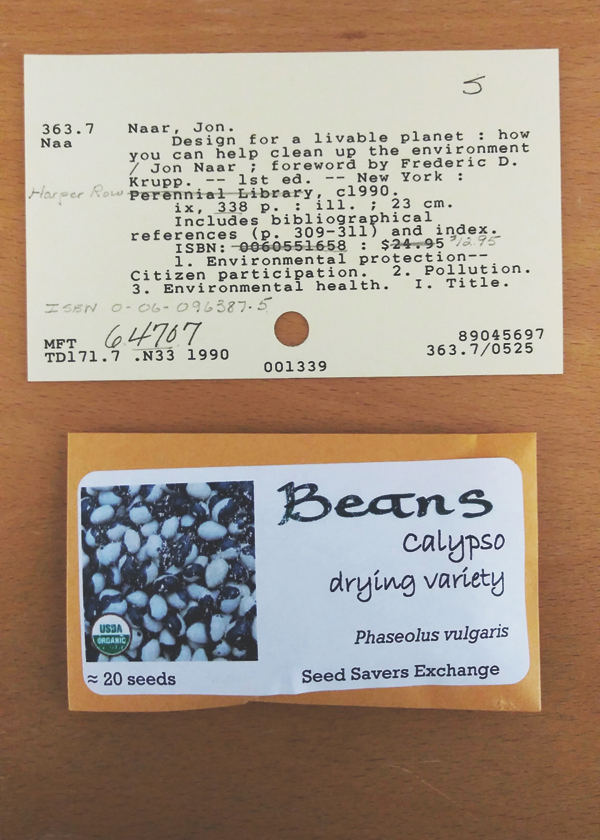
When local libraries began to introduce computers with searchable databases, most patrons thought they’d seen the last of the old card catalogs — those imposing wooden drawers filled with index cards that contained arcane data decipherable only by librarians. But three libraries on the Outer Cape are proving that there’s still life in the old cabinets — and in the cards themselves.
“When online catalogs made the drawers defunct, many of us were terribly sad,” lamented Naomi Robbins, assistant director at the Wellfleet Public Library. “We thought of alternative uses to justify keeping a few sets around as an homage to library roots — and because we just find them beautiful.”
Unlike many libraries, Wellfleet never mothballed its card catalogs. Instead, it simply demoted them — to serve as pedestals for their successors. “Which always seemed an ironic twist — the old card catalog supporting the new electronic one,” Robbins said.
Then a better repurposing idea presented itself. “For years, I’d wanted to offer vegetable seeds at the library for home growers,” Robbins said. Call it providence or coincidence, but the old wooden drawers were the perfect size for housing and organizing seed packets. In early 2015, the Wellfleet Public SEED Library took root.
Each winter, Robbins selects a menu of seeds from companies that are certified non-GMO and largely organic. “I take recommendations from local gardeners to broaden our offerings every year, and to assure that the varieties we offer are suited to our location,” she said. The Friends of the Wellfleet Library covers the cost of the seeds, as well as farming magazines and public programs on gardening.
“Every year we’ve seen about a 500-packet increase from the year before,” Robbins said. “This year, we’ve distributed approximately 2,400 packets of seeds.”
Robbins pointed out that Wellfleet did not invent the idea of libraries distributing seeds (with or without card catalogs) — in fact, the first seed bank on Cape Cod sprouted a couple of years before Wellfleet’s, and a few miles to the north.
“We started our seed library in 2013, but it was kind of a soft opening,” said Tricia Ford of the Truro Public Library. “I wasn’t sure if it was a good idea, and I was a fairly new director, who was very cost-conscious. It wasn’t until March 2014 that I realized that we were onto something.”
Truro, with several existing farms and a vineyard, turned out to be quite receptive to the program. “At first, we had a membership form and careful inventories, but people just help themselves now,” said Ford. Though Wellfleet purchases most of its seeds anew each year, in Truro, “people take seeds from the library, plant the seeds, and ideally bring seeds back to the library,” Ford said.
Despite the project’s success, the Truro library was not as lucky as Wellfleet’s when it came to holding onto its card catalogs. “Our remaining card catalog is small, with only 12 drawers,” Ford said. “Only a piece of what was once here still exists — which is too bad, because they are worth a fortune now!”
Indeed, vintage card catalogs fetch hundreds, even thousands of dollars on websites such as eBay. The catalogs’ tiny drawers have proven ideal for sorting and storing things, such as sewing materials, arts and craft supplies, hardware and … you name it. (In fact, you can name it — thanks to the familiar index plates on the front of each drawer.)
Like the Wellfleet and Truro libraries, the Provincetown Public Library has put one of its old card catalogs to new use, but it doesn’t trade in seeds. Instead, the old catalog is now the home of a unique collection of recipes — many clipped from newspapers and magazines, others typed on a manual typewriter, and each with a written heading, all apparently by the same hand.
“Someone found all the [recipe] cards at the dump and brought them to the library,” said Debra DeJonker-Berry, Provincetown’s former head librarian, who now runs the Eastham Public Library.
The cabinet housing the recipes is dedicated to the memory of Alice Joseph, the much-loved librarian who ran the Provincetown library from 1965 to 1982, but the identity of the person who collected and labeled the cards remains a mystery. We know only this: that he or she was a completist, as the collection contains scores if not hundreds of recipes for staple dishes like “spaghetti” and “stew.”
The small 16-drawer cabinet that houses the recipes can be found tucked away in a corner of the library’s second floor, dwarfed by the replica of the Rose Dorothea. While the location may seem unprepossessing, it’s better than the old catalog cards’ former home.
“They sat in boxes under the staircase for years until we opened the new library,” DeJonker-Berry said, pleased that both catalog and recipes have been given a new lease on life. “It was a natural fit: the index cards and that beautiful old piece of oak furniture.”
